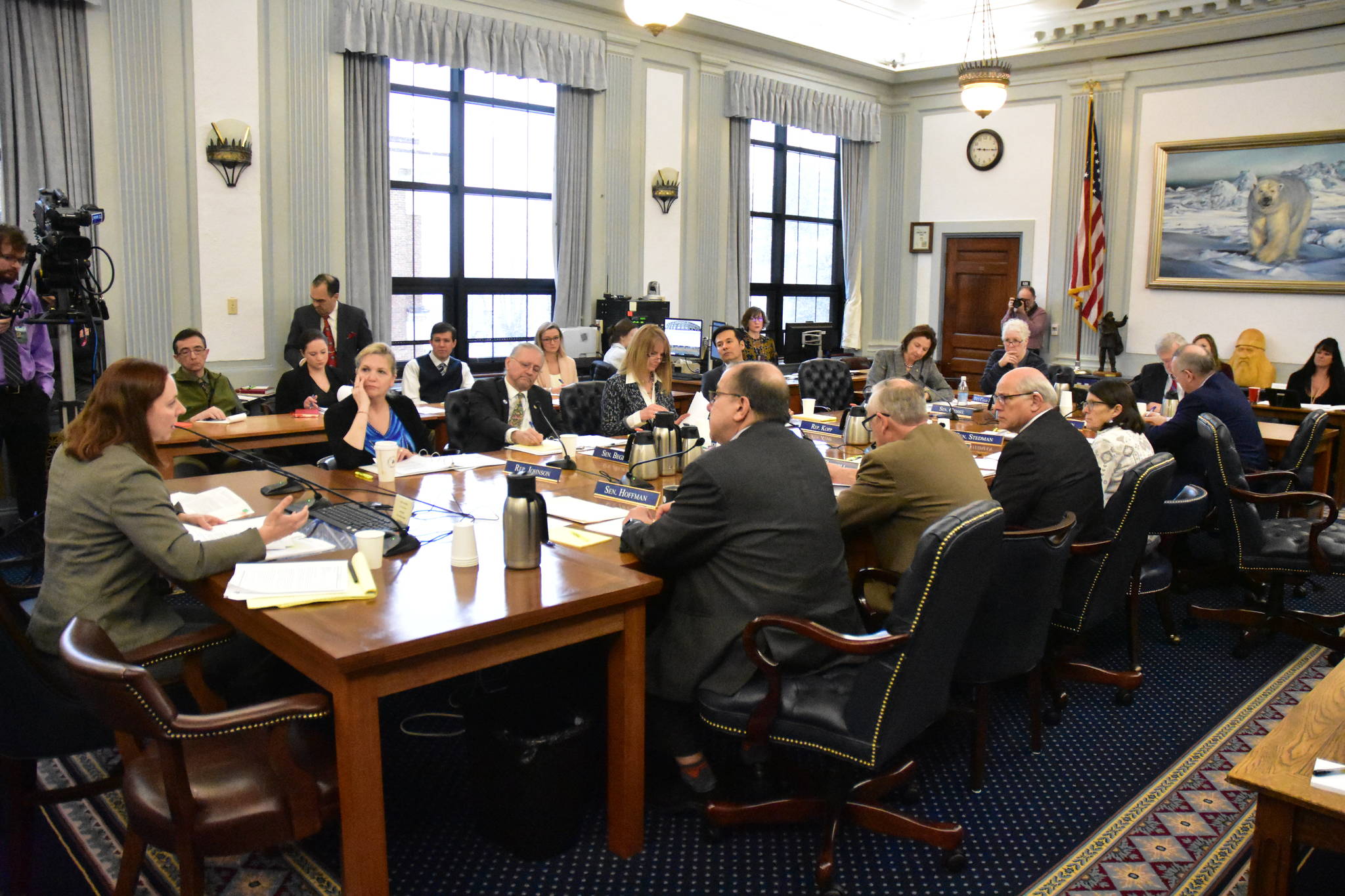Summary: Much of the conversation has surrounded how to implement the taxes and what additional resources might it take to review the taxes. While some legislators, Sen. Von Imhof in particular, have signaled fierce opposition to the initiative, other Republicans have not signaled outright opposition.
Several of the lawmakers present have expressed interest in looking at increasing the transparency of companies which operate on the North Slope.
When thanking the Department of Law and Department of Revenue people who’ve answered questions today, Sen. Stevens, jokes,”I’m sure this will be the last we’ll be hearing of this.”
10:37 a.m.
There are important issues with tax transparency being raised, Barnhill says, but the current conversation is veering into advocacy for and against an initiative, which DOR wants to refrain from engaging in.
Begich says he takes exception to the characterization of the conversation as advocacy. The conversation is about public policy concerning initiatives, he says.
10:32 p.m.
Deputy Commissioner of the Department of Revenue Mike Barnhill and other department members are now answering questions about implementation of the initiative.
Colleen Glover, tax director for DOR, begins by saying tax filing software would need to be updated to allow for taxpayers to file monthly tax returns, as well as programming for the calculations. That would need to be done within 90 days, which is a “big lift,” she says.
Von Imhof raises the concern the initiative would require oil producers on the North Slope to open their books, which no other companies operating in the state have to do. Sen. Bert Stedman, R-Sitka, says that in Norway, there is a more open process when it comes to oil companies, and it’s something that should be looked into without crossing a line between company privacy and state interest.
Begich says other jurisdictions require reporting, and that it’s not an unreasonable request, and the state should find a balance.
10:12 a.m.
“I don’t think anybody doubts there’s going to be litigation,” Begich says, but he says he believes the initiative is clear it’s referring to legacy fields on the North Slope. Nauman says the language of the initiative could be construed to mean fields beyond legacy sites and that might be the subject of lawsuits.
9:59 a.m.
Megan Wallace, Legal Services Director and Emily Nauman for the Legislative Affairs Agency are now answering questions about what the legislatures role in an initiative are and what the specifics of the Fair Share Act are.
The two large differences between the proposed imitative, Nauman says, it the Act would tax by field rather than by producer, and would tax monthly rather than annually.
After Nauman walks through the provisions of the act, Sen. Natasha Von Imhof, R-Anchorage, says that with every tax there is a corresponding reaction. With the many layers of taxes in the initiative she believes it would ultimately shut down production on the targeted fields on the North Slope.
9:37 a.m.
The law would put the initiative on the next statewide election after the Legislature adjourns, according to Mills. Enactment is not the same as an effective date, Mills says. Enactment happens after election certification but the effective date is when the actual law goes into effect. The effective date would have to be set either by the legislation or the initiative.
But even once the law goes into effect, there is a process of reviewing the new regulations and implementing them. The legal requirement is that review must take place within a month, but that’s not always how quickly the process can be done.
Sen. Tom Begich, D-Anchorage, asks if there is a maximum amount of time which the review process has to take place. If the review is not finished within a year, it’s considered stale, Mills says, and DOL recommends the process begin again. She said she would have to refer to case law to look into challenges of that process to see if there was any case law trying to prevent that from happening indefinitely.
9:21 a.m.
Mills says DOL’s opinion would be based around whether the legislature was trying to override the initiative process of the people. Sen. Gary Stevens, R-Kodiak, asks what exactly that might look like, but Mills says that would depend on the specific initiative and legislation and tells Stevens to consider the intent of the legislation versus the initiative.
9:10 a.m.
Assistant Attorney General Cori Mills says she will be discussing the process involved with the initiative process, and the Legislative Legal Division will be discussing the substance of the initiative itself. Mills says she cannot speak to certain aspects of the initiative process because the group which filed the initiative, Vote Yes for Alaska’s Fair Share, is currently suing over the wording the state used to summarize the initiative.
The state is working through the process of certifying the initiative and hopes to have certification done by March 17.
There is also legislation that would have similar effects on oil tax credits, Mills says. If that legislation passes DOL will issue an opinion on how substantively different the legislation is from the initiative.
9 a.m.
The Legislative Council, a combination of Senators and Representatives, is getting a presentation from the Department of Law about the “Fair Share Act.” The Fair Share Act is a ballot initiative which would remove some of the oil tax credits the state gives to certain petroleum producers on the North Slope. Proponents say it would increase revenues and help the state pay for essential services. Detractors say it would hurt oil producers and ultimately cause a decline in production.

